Peter MALONE
Saturday, 18 September 2021 19:28
Marooned
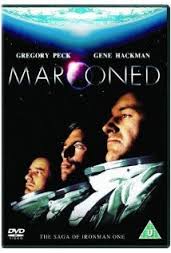
MAROONED
US, 1970, 134 minutes, Colour.
Gregory Peck, David Janssen, James Franciscus, Richard Crenna, Gene Hackman, Lee Grant, Mariette Hartley, Nancy Kovack.
Directed by John Sturges.
Marooned is a well made space adventure (not a space odyssey) which should satisfy most fans of straightforward action movies. The theme is taken from the 1960's exploration, and echoes, at times alarmingly, some of the difficulties in particular projects over the years. However, this is one of those morale boosting American epics, in which one presumes that all will end on the whole well, because Gregory Peck is in charge and will bring everything to a safe conclusion.
The film, in its dialogue specifically as well as some of its situations, raises some very important questions about space exploration and men's lives, the expenditure of money by America and where it ought to be spent. The film also has a desperate situation for decision ? not enough oxygen for the three men to stay alive until rescued, but enough for two.
Peck is his impeccable self. Gene Hackman does another kind of role. David Janssen gives one of his usual performances.
1. Did you enjoy this film? Why?
2. Did the film seem authentic to you in its picture of the
realities as well as the dangers of space exploration?
3. Does a film like this create admiration for man's space projects? Pithy ?
4. Does the film raise questions about so much effort, thought, engineering money into such projects when so much is needed here on earth? Keith, in the film, answers 'yes'. Do you agree? Why?
5. How interesting was the programme in which the three astronauts were involved? What benefit was it? Why did they begin to slow down after some months? Was the decision right to bring them down before time? Why?
6. How frightening is human error and mechanical failure in such incidents as the failure of the capsule to achieve retrofire? Why? Are astronauts adequately prepared for the worst?
7. Comment on the characters of the three astronauts, their relationships with one another, their dedication to and understanding of their jobs, their response to the crisis. How could the situation have been bettered? Why did one man lose his nerve? Did Keith have the right to suggest that one of them die?
8. Why did Pruett choose to die? Why did he do it the way he did? What was the effect on the others, on you? Can a man do this for others? Why?
9. How did the introduction of the wives and their conversations with their husbands add to the film? The effect of Keith telephoning the news to Mrs Pruett? Could this have been handled better?
10. Keith as a person? The fact that stalwart Gregory Peck played the part? How did Keith handle the situation? Was he too cautious or did he take all factors into consideration? His response to the President? His talking to the three astronauts, to their wives; his responsibilities of life and death, of millions of dollars, to the team at Huston and Cape Kennedy? (The significance of his being chased by the police?).
11. Dougherty ? as a character? Was he wise? Was his impulse to arrange the rescue sound?
12. Was the rescue worth everything ? cost, energies, planning? Were the lives worth this? How important was the morale angle, the political angle?
13. How disappointed were you when the hurricane prevented blastoff? How pleased about the eye of the hurricane?
14. The reporters and their questions ? especially the critical ones? Keith's handling of the questions?
15. The significance of the Russian co-operation?
16. The relief that the men were saved?
17. Is this film rightly optimistic? Why? Was it a pro American propaganda film or a genuine American contemporary adventure?
Published in Movie Reviews
Published in
Movie Reviews
Tagged under
Saturday, 18 September 2021 19:28
Maroc 7
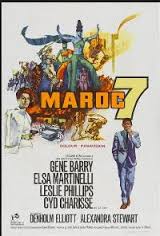
MAROC 7
US, 1967, 91 minutes, Colour.
Gene Barry, Elsa Martinelli, Cyd Charisse, Denholm Elliot, Alexandra Stewart, Leslie Phillips.
Directed by Gerry O’ Hara.
Maroc 7 is the type of lavish thriller-caper popular in the mid 60s. Much of the impetus for this kind of entertainment came from the popular success of the James Bond films.
This film has lavish production values including spectacular location Panavision scenery. It also has one of the oddest mixtures for its cast, ranging from American Cyd Charisse (acting less well than she dances), solid hero Gene Barry with Elsa Martinelli as a criminal model and Leslie Phillips trying not to be too comic as a crooked photographer. Denholm Elliott assumes an accent for his role as a police officer. There is a great deal of glamour of the swinging '60s, English style (a feature of the films of writer director, Gerry O'Hara). It is passable entertainment for an undemanding audience.
1. The popularity of this kind of caper adventure in the '60s? Lavish style? Production values? Passable entertainment?
2. The atmosphere of swinging London in the '60s, the world of fashion and affluence?
3. The transition to Morocco and the use of Moroccan locations? City, desert, isolated fort? Editing and pace?
4. Music, the party music of the period, the title theme? The reality and unreality of this kind of crime story? The exotic bestseller characters? The undercover policeman? The world of international intrigue? Perennially popular ingredients?
5. The focus on Louise? Cyd Charisse, her glamour, her models and her hold over them, her photographer, the parties, Simon intruding and her taking him on? The magazine? Her background as a jewel thief? Her plans for Morocco? The success, the failure, the violent confrontation?
6. Simon as hero? tough American, loner, undercover agent, insinuating himself into Louise's house, party, her accepting him as a thief? As partner? His participation in the events? The contact with Inspector Barrada? With Michelle? His success in playing a double game? The final difficulties with the medallion, the violence at the Berber fort? Michelle's disappearance and his joining her in Tahiti? A cynically ironic ending?
7. Claudia and her glamour, sinister aspects, participation in the plot, using her wiles with Simon? Her involvement in the final violence?
8. Raymond and his skill as a photographer, his work as a criminal? The sketch of the police ? Inspector Barrada and his work, suspicions, involvement? The help from Michelle - and her story of Tahiti? Her glamour, attractiveness? Her taking the medallion and escaping?
9. The sketch of the models and the world of fashion models? International travel? Photograph session? The mixture of hard work and glamour?
9. The amoral world of international crime, cover ups, affluence and glamour? The perennially popular adventure and soap opera material?
Published in Movie Reviews
Published in
Movie Reviews
Tagged under
Saturday, 18 September 2021 19:28
Marnie
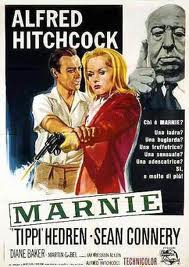
MARNIE
US, 1964, 130 minutes, Colour.
Tippi Hedren, Sean Connery, Martin Gabel, Diane Baker, Louise Latham.
Directed by Alfred Hitchcock.
Marnie is interesting Hitchcock entertainment. It is a sign of contradiction amongst his critics and admirers, receiving both accolades and abuse. It was the film in which he hoped to lure Grace Kelly, who had appeared in Dial M For Murder, Rear Window, To Catch a Thief, back to the screen. However, he had to use Tippi Hedren who had appeared in his previous film The Birds. Sean Connery is a sturdy Hitchcock hero.
The film has the usual themes of crime, guilt, transference of guilt. The background of the film is sordid and there are some interesting flashbacks involving Bruce Dern, who was to appear in Family Plot. The film seems rather contrived ? aristocratic American society with an English touch ? maids and riding to hounds. This is contrasted with slums and sailors and murder. There are also some devices to highlight the psychological background and effect ? the screen going red with Marnie's secret, her fear of blood. Hitchcock has always used 'old fashioned techniques' and his thrillers have the atmosphere of contrivance. However, this said, they are always stylish and have interesting implications as regards human relationships and responsibility. Screenplay is by Jay Presson Allen from a novel by Winston Graham.
1. The audience response to Hitchcock films? The quality of this one in itself, in Hitchcock's canon?
2. The combination of psychological drama with suspense crime dram and thriller techniques? Which was meant to predominate?
3. The use of location photography, studio effects? Colour, the artificial devices as the flashback, the screen going red? The background of Philadelphia? The contribution of Hitchcock's frequent musical composer, Bernard Hermann?
4. The tone of the opening: Marnie, her bag, her hair, the use of the colour yellow? The money? Sufficient atmosphere of mystery about her, her identity, an attractive young woman and robberies? Mystery about her background? Her mother?
5. The significance of Marnie's mother? money, the jealousy of the girl, the nightmares, her love? The recurrence of the nightmares and the fears, Marnie's attitude towards men?
6. The encounter with Sidney Strutt? The association with Mark Rutland? Employment? The irony of his reappearance at the end and the crisis for Marnie?
7. Marnie at work? Her technique for working hard, getting a good reputation? The contrasts with her visits to her crippled mother? The horse? The encounters with Rutland? Seeing him as employer, as a man?
8. Mark and his attraction to Marnie? Why? Fascination, curiosity? The sexual attraction? His courting her, the outings, the storm and the fear, the races? The Possibility of Marnie actually overcoming her fears?
9. The picture of the Rutland family - the father, Lil and her ironies? The other relations? Their affluent way of life and Marnie’s having to adapt to it?
10. The build-up to the robbery, the techniques of filming it for audience involvement and suspense? Audience anticipation of Marnie’s being caught especially by Mark?
11. Mark and his decision to pursue Marnie, his hold over her, the marriage? Marnie's warnings, the hopes of both?
12. The honeymoon and the voyage, Marnie's fear and frigidity, the bargain between them, the effect on each, Mark and his attack and the equivalent of rape? The contrast between the intellectual unemotional approach to life and the instinctive? The psychological implications and the animal imagery?
13. The character of Lil ? her place in the household, her curiosity, invitations?
14. Marnie after the honeymoon? aloof, the telephone call to her mother, the situation with the police? The background of her attachment to her horse, the ride, the fall, the impact of the death of the horse?
15. The party, her having to cope, the nightmares?
16. The psychological effect of Marnie and her guilt, responsibility, Mark and his determination to make her face the truth, his acceptance of her guilt? The use of the red screen in connection with this?
17. The importance of her return home, the importance of the flashbacks and the way they were filmed? The filling in of the story ? as sensational as the audience had been led to expect? The memories of her mother, her prostitution, the sailor, the fight over the child, the child Marnie hitting the man with the poker, her mother taking responsibility? The explanation of the terrors about men, storms, red for the sailor's blood? The importance of liberation from the past, the facing of the past, the overcoming fears for the future? The prospect of Marnie and Mark for the future?
18. Hitchcock's exploration in thriller form of themes of repression, sexuality.. violence, fear, childhood? Crime? The role of parents? The effect of trauma on an innocent child, retaining her purity but needing love and taking a crime outlet?
19. A satisfying blend of psychological drama and thriller?
Published in Movie Reviews
Published in
Movie Reviews
Tagged under
Saturday, 18 September 2021 19:28
Mark of Zorro, The
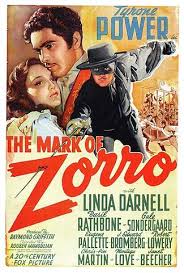
THE MARK OF ZORRO
US, 1940, 94 minutes, Black and white.
Tyrone Power, Linda Darnell, Basil Rathbone, Gale Sondegaard, Eugene Pallette.
Directed by Rouben Mamoulian.
The Mark of Zorro has become a classic swashbuckling film. Originally made in 1920, this remake capitalised on the athletic prowess of Tyrone Power (who was to make Blood and Sand for director Reuben Mamoulian). Power was later to be in such action films as Captain from Castille, Prince of Foxes, The Black Rose. However, he is not as good as Errol Flynn in similar roles, even with the same villain, Basil Rathbone. Linda Darnell is an attractive heroine. Photographed in black and white, with a rousing score by Alfred Newman, the film is straight forward action adventure with slight tongue in cheek.
The film was remade for television with Guy Madison, and later with Frank Langella. An exciting '70s version featured Alain Delon and Stanley Baker, with an excellent swordfight at the end. The story was spoofed by George Hamilton in Zorro, the Gay Blade (Zorro Swings Again, 1981). Reuben Mamoulian directed such classics as Applause, Dr. Jekyll & Mr. Hyde, Becky Sharp. He made fewer films in his later years, his last being Silk Stockings. He began Cleopatra.
1. The acclaim and status of the film? As an example of the swashbuckling genre? Its influence on later films? Comparisons with the Errol Flynn features of the same time. Entertaining adventure?
2. Twentieth Century Fox production values and stars? Comparisons with Warner Bros? The popular story as part of the folklore of California? Comic strip hero but with verve? Black and white photography, the rousing score?
3. The historical background of Spain and California? The court of Spain, the training of the Californians in military careers? Diego and the army, his skills, place at court, his having to return? The background for his becoming Zorro?
4. His thinking that California was at peace? The discovery of the oppression? The initial hostility towards him? The Governor and the resignation of his father? The oppression of the people and their suffering? Social awareness?
5. The Governor and his foolishness, love for money, fear? His wife and her enjoyment of position, wealth, fashion? Liaison with Estaban? Her wanting to return to Spain? Her vanity and greed? Her riding with Diego? The final confrontation with the Governor and his wife and their returning to Spain? The sly satire on this kind of administration and its oppression?
6. Basil Rathbone once again as villain? His portrayal of Estaban and his cruelty? Duelling background in Spain? His administration of California? Suspicions of Diego? His arranging the marriage with Lolita? The final confrontation and swordfight? The soldiers and their oppression?
7. Tyrone Power as romantic hero? Diego the hero, his pretending to be a fop, his indolent style, magic tricks? People believing that he was a weakling? His enjoyment of this performance? The transition to Zorro - the mask and the black clothes, his taking the money from the Governor, the escapes from confrontation, meeting Lolita in the chapel and proposing to her, the final confrontation with the Governor and fighting Estaban? Diego and his parents thinking he was weak? The confrontation with the Friar and the revelation of the truth? Lolita and her despising him. her enjoying the dance but reacting to his tiredness? Her delight in discovering the truth? The final imprisonment and heroics?
8. Lolita as conventional heroine. her youth and beauty, seclusion, fear of going to the convent? The encounter in the chapel and her romantic love for Zorro? The betrothal, the dance, her despising Diego? Her delight in the truth?
9. The friar and his helping the people, his anger, arrest? His vigour in the final battle ? asking God's forgiveness!
10. Diego's parents? His father and his administration? His leading California to prosperity once again?
11. The background of the social setting and the points made? The background for heroism and romance? The perennial appeal of swashbuckling epics?
Published in Movie Reviews
Published in
Movie Reviews
Tagged under
Saturday, 18 September 2021 19:28
Marked Woman
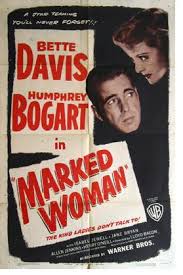
MARKED WOMAN
US, 1937, 96 minutes, Black and white.
Bette Davis, Humphrey Bogart, Lola Lane, Mayo Methot, Isabel Jewell, Eduardo Cianelli, Jane Bryan.
Directed by Lloyd Bacon.
Marked Woman is one of many gangster films produced by Warner Bros. in the 1930s. It is distinctive, however, with having Bette Davis in the starring role. She is a goodtime girl, a companion for wealthy businessmen who go to a nightclub run by Eduardo Ciannelli. She supports him, but when he betrays her sister (played by Jane Bryan), she is roughed up and becomes the marked woman. She then joins forces with District Attorney, Humphrey Bogart in a law-abiding role, to expose Ciannelli. Familiar material but briskly done in the Warner Bros. style - director Lloyd Bacon had made many of this kind of film.
1. The popularity of the gangster film in the '30s? Warner Bros. emphases on gangster films? Portraying the gangster world, characters? The law? Exposés? Moralising tone? The tradition during the '30s? This film from 1937?
2. Production style: Warner Bros. sets, black and white photography, crisp style? Musical score and songs?
3. The contribution of the stars? The particular points in their career? An offbeat role for Bette Davis? Humphrey Bogart moving towards star roles?
4. The significance of the title? The focus on women? Not only Mary but the group of women? The point about relationships between men and women, treatment?
5. Setting the situation: the clubs, the hostesses and their duties, the bosses? Glamour, style? Relationships? Good times? Cheap and expensive? The women being used? The hours, the behaviour, coaxing the drinks etc.? The brutality of the owners? The subsequent violence? Corruption. the law? The expose? and the five women walking off at the end? Optimistic ending?
6. Mary as the focus of the film? Strong, standing up to Vanning? Her leadership of the girls? Work, the apartments? The nightclub. their routines? The accompanying of the man who didn't pay his account? His death and her association? The arrival of Betty, her sister not knowing Mary's job? Her trying to protect her, indicate that she belonged to fashions? The police arriving, the arrest? The trial and the pressure on Mary from Vanning's men? The discussions with Dave, Mary's double-cross? The clash? Betty and her reaction to Mary in court? Betty's going to the party, clash with her sister, her death? Mary's vengeance? Going to Dave? The dangers. her being physically abused and marked? The court case? Newspaper headings? Her winning? The friendship with Dave? The friendship with the women and standing up for them? The five going off at the end?
7. The picture of Betty: school, hopes, naive. coming to the city. her reaction to Mary's trial, going to the party, the $100 bill Vanning, her death? The catalyst for the expose?
8. The portraits of the girls, tough, hostesses in action, singers, clothes, money, contacts, apartment? Vanning's dominance? Their fears? Dangers? Their deciding to testify?
9. Vanning and his brutality? Wealth. ignorance (club 'intimate'), his henchmen, thugs, the murders, the lawyers? Press reaction? The judge?
10. The sketch of the police, the courts, their reaction to corruption?
11. Humphrey Bogart as District Attorney, earnest, building a case, ambitious, working with Mary, losing the case and her doublecross? Pursuing Mary and getting her to testify, the cross examinations, the end of the trial?
12. The picture of victims, gambling, dangers? American society in the cities of the '30s? The style of the gangsters? Influence on subsequent gangster films?
Published in Movie Reviews
Published in
Movie Reviews
Tagged under
Saturday, 18 September 2021 19:28
Mark of the Beast
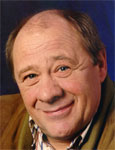
MARK OF THE BEAST
Holland, 1980, 98 minutes, Colour.
Gerard Thoolen.
Directed by Pieter Verhoeff.
Mark of the Beast is an example of Dutch filmmaking of the '70s. It is a period melodrama focusing on a murderer and trying to understand him in his context and in his character. While the film has the ingredients of melodrama, it aims at something more in being a study of human nature and society.
1. The quality of the film as character study, insight into society, melodrama and serious dram?
2. The qualities of Dutch production: colour photography, authentic locations, atmosphere, sense of period and history? Musical score?
3. The importance of the information given at beginning and end? The voiceover technique and its effectiveness? The reflection on the action and the characters? Justice?
4. A picture of Dutch society, a town: ordinary, people at work, wealth and poverty, church and religion, socialising e.g. the dancers? Scandal or lack of scandal in Dutch society?
5. Yje and his attitudes, reading, sense of elitism? His intellect and his insights? Themes of freedom? His antagonism towards religion? His philosophising? His animal passion? Play, his friends, etc.? His mother and brother?
6. Yje as a character in a drama, as a characterisation of a type? His sullenness, work, the play, the visit to the woman, the encounter with her husband? The possibility of non involvement?
7. The arrest, the involvement, the resistance? The children? The seduction? His staying? Passion, the 14 days? The change in the housekeeper? His mother and brother?
8. The picture of the family: flirting, drunkenness, the visit and the records, his arrest, the children and their observation? The woman and her need, desperation? The birthday party?
9. The importance of the friend and the support? The play, the wedding?
10. Themes of church and religion? Religious? stances? His brother?
11. The mother, needs, bonds, church and religion, hurt?
12. The police and interference?
13. The courts, the build-up, the police? Hysterics, shooting, madness?
14. The justice of the situation, in theory, in practice? The study of a character? The credibility of such a character in such society?
Published in Movie Reviews
Published in
Movie Reviews
Tagged under
Saturday, 18 September 2021 19:28
Marilyn : The Untold Story
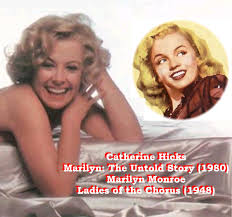
MARILYN - THE UNTOLD STORY
US, 1980, 150 minutes, Colour.
Catherine Hicks, Richard Basehart, Frank Converse, John Ireland. Viveca Lindfors, Jason Miller. Sheree North.
Directed by John Flynn, Jack Arnold, Lawrence Schiller.
Marilyn - The Untold Story is based on the book by Norman Mailer. However, all the ingredients presented in this telemovie can be found in standard books about Marilyn Monroe e.g. Joan Mellen's paperback 'Marilyn Monroe' or dramatised in Garson Kanin's 'Moviola'.
Catherine Hicks is excellent as Marilyn Monroe and for the duration of the film seems to be Marilyn herself. She makes the transformation from a young girl to tragic star about to die. She has obviously studied Marilyn Monroe and impersonates her excellently, even to the smallest mannerisms. There is a very good supporting cast representing real characters. There are short interpretations of characters and scenes from her films or the making of her films, ranging from The Asphalt Jungle through How To Marry A Millionaire to the English experience Olivier and The Prince and the Showgirl to The Misfits.
Marilyn's private life is suggested and sometimes glossed over (especially in comparison with Larry Buchanan's emphasis on the sordid early experiences of Marilyn in his Goodbye Norma Jean). The encounter of Marilyn with Johnny Hyde is also explored in the television presentation of Garson Kanin's chapter in Moviola (with Constance Fordlund as Marilyn and Lloyd Bridges as Johnny Hyde). Marilyn is presented sympathetically throughout a victim of her circumstances, her parents, her lack of a father, her ambition to be a star, the influences of her coaches and of her husbands. The failed marriages are presented very much from Marilyn's point of view, even that with noted playwright Arthur Miller. There are psychological suggestions for Marilyn's failure and her addictive personality - the reliance on pills and then drink. The suggestion of a heritage of mental imbalance is also presented. The film keeps the attention while it is on the screen but it merely recapitulates very entertainingly what was generally known about Marilyn Monroe. Direction is by veteran Jack Arnold and thriller director John Flynn.
1. The focus of the title on Marilyn Monroe herself? The reference to Norman Mailer's book and his insights? The contrast of the title The Untold Story with critics remarking that it was the 'oft-told story'? The material available from magazine articles and books?
2. The film made for television audiences and their response? The presentation a screen legend. the origins of a star, her rise to glamour, her achievement on the screen, her personal tragedy? Her association with the great names of films in the '50s and '60s? The older audience and the memory and recapitulation of Marilyn's life and career? The drama and melodrama of her life? Her place in American popular culture - as sex symbol, as talented comedienne, as wife of Arthur Miller and the inspiration for The Misfits and After the Fall?
3. The style of the screenplay ? the emphasis on soap opera and easy and immediate communication of characters and themes? How much depth? Audiences' emotional response? Interest and curiosity? The film's theory about Marilyn's career and life? The influence of her mother, the lack of home life, her being abused as a child, her insecurity about her parents, her absent father and her husbands as substitutes, her driving ambition, her need for reassurance, addiction?
4. The quality of the colour photography, the re-creation of the period, the re-creation of Hollywood. of Marilyn's films and their production? Decor and costumes? Musical score and the use of the theme song 'My Foolish Heart'?
5. The length of the film and sustained interest, the quality of the coverage of all aspects of Marilyn's life and career? The framework of her last illness and death in 1962? The sketching in of some detail? The quality of Catherine Hicks' impersonation and performance, manner, style? Recreating Marilyn Monroe and continually drawing audience attention to her to understand Marilyn's personality?
6. Marilyn's childhood, the instability of her mother, her outings with her mother, especially to Grauman's Chinese Theatre, her talk about her ambitions as a star? As working at the candy bar? Her guardians? Her mother's madness and being institutionalised? Her going to film? Her lonely run down Hollywood streets to find her mother? Her mother's being in the institution and Marilyn's lies about her, her visit to her and her mother wanting her autograph? Her appeal to her father and his snubbing her on the phone? His later concern and her snubbing him? Her fear of going like her mother? Her need for a father and her relationships with Johnny Hyde and her husbands?
7. The dating with Jim Doherty, their being married, her work during the war, his being posted overseas and her sense of being abandoned, her being invited to do modelling work, the famous calendar (and the old man at the garage recognising her later)? The inevitability of divorce ? hastened by the pressure of the studios for their starlet not to be married?
8. The influence of Natasha and her style of training Marilyn, Marilyn auditioning and her emphasis on her figure and bust, with good humour? Her working in the chorus and discussions with the chorus girls? Her being coached and trained as well as being guided personally by Natasha? Natasha's consent about her roles, presence on the set? Her later being fired and appealing in vain for reinstatement? The lack of emphasis on Paula Strasberg's subsequent training of Marilyn?
9. The sketch of Johnny Hyde and his work for the studios and agencies, fascination with Marilyn, leaving his wife and children, infatuated with her, her operation on her nose, the introduction to John Huston, the scenes of her acting the screen test for The Asphalt Jungle, the lyrical time with Johnny Hyde, his death?
10. Her work at 20th Century Fox, the rehearsal of the songs for Gentlemen Prefer Blondes, the sequence from How To Marry A Millionaire? The encounter with Joe di Maggio, the outings, getting to know each other, the build up to their wedding? The honeymoon in Korea and her going on tour and singing for the troops? His irritation at this? His dislike of the famous sequence and people's response? The Seven Year Itch? The growing clashes, the isolation? Her press conference and tears announcing the divorce? His later interest in her and blaming her friends for her death?
11. The early meeting with Arthur Miller and his interest in her? Suggesting reading? His later meeting her in New York? Their discussions? Her working at the Actors' Studio with Lee Strasberg? The discussions about acting with the young actors? Her marrying Arthur Miller? The impact at the time - the sex symbol with the intellectual playwright? Miller's moulding her? Her going back to work - the song from Bus Stop? Her behaviour in England for The Prince and the Showgirl? Overawed by Olivier, her tantrums at the hotel, being persuaded to work by Sybil Thorndike? Her work on Some Like It Hot and Billy Wilder's help, the exasperation of her lateness, the good reviews?
12. Arthur Miller's growing exasperation with her tantrums? The affair with Yves Montand during the making of Let's Make Love? The reaction to the reviews of Some? Like It Hot? His writing The Misfits and her reaction to the character of Rosalyn? The making of The Misfits and her encounter with Clark Gable and her talk about idealising him? The help from Montgomery Clift? Her many takes during The Misfits and Clark Gable's death, people blaming her? The asylum sequence and her breakdown? The long interview and session with the psychiatrist? George Cukor encouraging her at Something’s Got To Give? The executives firing her from the film? The lawyer discussing her career?
13. Her going downhill, her lack of balance, the many sequences of her relying on tablets, her drinking, her fading away in death?
14. How well did the film capture the tragedy of people in the public eye? The pathos of their experiences? Their achievement in entertaining people in the films that they made? What did the film contribute to the solving of the enigmas about Marilyn Monroe's life?
Published in Movie Reviews
Published in
Movie Reviews
Tagged under
Saturday, 18 September 2021 19:28
Maria's Lovers

MARIA'S LOVERS
US, 1984, 103 minutes, Colour.
Robert Mitchum, John Savage, Nastassji Kinski, Keith Carradine, Anita Morris, Bud Cort, John Goodman, Karen Young, Vincent Spano.
Directed by Andrei Konchalovsky.
Maria's Lovers was co-written and directed by celebrated Russian director (Siberiade) Andrei Konchalovsky. After some years in the United States making an Oscar-nominated documentary, writing scripts and lecturing, the Cannon Group (Golan and Globus, who tend to make package films or exploitive films or both) offered him the opportunity to make Maria's Lovers. The original screenplay was by Gerard Brach, a collaborator in many scripts, including Tess, with Roman Polanski. It was adapted by Pulitzer Prize winning writer Paul Zindel.
The film recreates the post World War Two period in Pennsylvania. The theme of the rehabilitation of returning soldiers and their difficulties in family and relationships was a theme of Coming Home. Coming Home was released in 1978, the same year as The Deer hunter which uses similar locations and the same star, John Savage. The themes of these films are intentionally interlinked. There is also a preface during the credits of Maria's Lovers where a documentary, Let There Be Light, made by John Huston, is shown, indicating the problems of the returning soldiers.
The film has a very interesting cast led by Nastassia Kinski. John Savage, an idiosyncratic actor, portrays the torment of the central character, Ivan. Robert Mitchum has a good role as his father. Keith Carradine has a showy role as a wandering singer. There is a blend of the serious and the comic, the tender and the exploitive. An offbeat and interesting film.
1. The impact of the film? Entertaining drama? A piece of Americana?
2. The work of the director? His Russian background, career, admiration of American films? American sensibilities and style, new eyes for American themes? (And the background of the French scriptwriter and American adaptors?)
3. The strong recreation of period, the mid '40s in the Pennsylvanian town, the town, the hills, the streets, houses, shops, the hospital etc.? The slaughter yards? Bars and cafes? An authentic feel for the period? The use of music and songs?
4. The credits quotation from John Huston's Let There Be Light? The work of a classic director? The visual impact of a documentary of the time highlighting problems for American returned soldiers? An interview with Ivan worked into the context of Let There Be Light? The war, tensions, coming home, reality and fantasy, coping and not coping?
5. Ivan in this context? His return to the town, going home, talking with his father and making him a meal, the reminiscences about being a prisoner of war, his father thinking he might be dead? The memories of Maria and his going to see her, discovering her with Al? The tensions in the first encounter with her on the verandah? His father's sending him off with Mrs. Wynic, the sexual encounter and its effect on Ivan? His courting Maria but wary of commitment? His riding his bike and exhilaration? The possibilities of settling home? Tension? John Savage's ability to convey this tension? Friends, work the hero's welcome? Al and his rivalry for Maria?
6. The focus on Maria? A balance to Ivan? Maria and her place in the town, pre-war memories? The Yugoslav background? The hometown girl? Going out with Al, the date, the friendship, intimacy? Her work at the hospital, her friends? Her old grandmother?
7. Ivan and Maria and their courting, the marriage ceremony, the religious background? A typical post-war couple? The first night and Ivan's impotence, the effect on him, the effect on Maria, her uncertainty? The repercussions on their marriage? Their continuing their life together and trying to cope with the problem? Maria coping? Ivan tormented? The arrival of Clarence in town, his remark about a good lay, giving Ivan his glasses, Ivan going to Mrs. Wynic, Maria seeing him through the window? Maria's upset, the clash at home? The sequences of her own sexual tension and release? Al's engagement, the dance, his dancing with Maria, the clash with Ivan, Ivan burning his hand? Al announcing the break off of the engagement? Ivan and Maria and their trying to cope - but the fact of the crisis?
8. Ivan leaving home, going on the train, finding work in the slaughter yards, making friends? Harvey and his support? A way of life, the time passing, enjoying the girls' company? Maria's arrival and her pregnancy, Ivan's rejection, Harvey's challenging of him? The arrival of Clarence, his singing, telling the story? Ivan's punching him? Ivan’s father coming to see him, their talk together, Ivan's return home? Maria in bed, the baby, his declaring his love for the baby? Their reconciliation, a hopeful future? The theme of impotence, Ivan's fantasy of Maria during the war helping him to survive, the return to reality, the clash between the two? Problems and their effects in the war and post war context?
9. Maria alone, Clarence's attentions to her, the cafe and his chasing her, his return, noting she was married, the seduction? The intimacy, his comments on her being a virgin? The clash after the liaison? Her abhorrence, sending him away? The irony of her pregnancy? The visit to Ivan and her matter of fact approach? Ivan's return and the reconciliation?
10. Clarence and his loud style, his bulldog. singing, smooth talking the bar proprietors. charm for the women. sex appeal? Chasing Maria? The song, Maria's Eyes and the lyrics? The encounter with Maria, his reaction, comments on her virginity? Leaving? The previous encounter with Ivan and giving him his sunglasses after the advice? The irony of their meeting again, his loud talk about his encounter, singing the song, Ivan's punching him? An effective character sketch?
11. Al and his Air Force background, dating of Maria, in love with her, his charm with the women, flirting at the dance, announcing his engagement, dancing with Maria and fondling her. Ivan's reaction, his response to Ivan's burning his hand. announcing the breaking of the engagement, his leaving town?
12. Robert Mitchum's character sketch of Ivan's father: the European background, age, work? His talking to his son? Expectations, welcoming his son home as hero? His relationship with Maria? With Mrs. Wynic? The wedding? His visiting his son and getting Ivan to return home?
13. Harvey and his friends. the help, work. nights out, challenging Ivan about Maria and the child?
14. A period film with relevance to later decades? The portrait of American migrants. the American Midwest, the ethnic communities? American families, traditions? Sexual problems, their causes repercussions, coping? The war as a catalyst for the United States?
Published in Movie Reviews
Published in
Movie Reviews
Tagged under
Saturday, 18 September 2021 19:28
March or Die
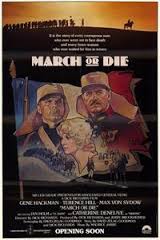
MARCH OR DIE
UK, 1977, 107 minutes, Colour.
Gene Hackman, Terence Hill (Mario Girotti), Catherine Deneuve, Max Von Sydow, Ian Holm, Rufus, Jack O'Halloran, Marcel Bozzuffi.
Directed by Dick Richards.
Beau Geste is the classic cinema image of the Foreign Legion: it was a rattling good story, blending heroics, action and mystery. This film has moments like this and some fine Moroccan visuals of the marching Legionnaires; however, much of the film is in darkness: Paris railway, Moroccan dives, nights before action. This slows down the action considerably, though the final battle is traditionally fierce. The attempts at interaction, themes of art/archaeology and the present, tribal unity are not so persuasive.
The international cast, harsh Commander Gene Hackman, doleful Catherine Deneuve, relentless Max Von Sydow and a restrained, genial hero in Terence Hill is better than the material. The film is one of Sir Lew Grade's many multi-starred entertainments like The Cassandra Crossing, Escape to Athena, Voyage of the Damned and even The Muppet Movie and Jesus of Nazareth. Direction is by Dick Richards who made such interesting films as The Culpepper Cattle Company, Rafferty and The Gold Dust Twins and Farewell My Lovely.
1. The tone of the title? The catchcall of the Foreign Legion? The indication of the atmosphere of the Foreign Legion? The popularity of this kind of film? The cinema traditions from Beau Geste etc.?
2. The conventions of this kind of adventure: the commander and his attitudes towards his men, to his mission, his heroism? The alternate hero and his lightheartedness, courage, daring, taking the place of the commander? The international archaeological explorers and their obsessive leader? The glamorous widow? The range of personnel in the Legion? Were they merely stock characters? How well characterised, explored?
3. The location photography, the atmosphere of France in the early 20th. century, the long opening at the railway station? The transition to Morocco? The restaurants and dives of Morocco? The desert, the encampment, the archaeological site? The musical score? Special effects? The vistas of the Foreign Legionaries in training, on the march, in battle?
4. The realism of the plot? The echoes of matinee material? The matinee emphasis or authentic plausibility? The plot sufficient for this kind of matinee material? The balance of realism and contrived conventions?
5. Gene Hackman's style as Major Foster? His American background? His work in Morocco prior to the war? His promise to the chieftain El Krim? The encounter with Marco The Gypsy? The relationship with Simone? His commission in the desert ? the searching for the treasure, France's financial needs, the shooting of Simone's father after he had been tortured, the encounters with El Krim, the discovery of the Angel of the Desert? His treatment of the men, the attack by E1 Krim? His death? A credible picture of a Foreign Legion leader?
6. The contrast with Marco ? his background as cat burglar, sense of humour, his behaviour on the train? In Morocco? His friendship with Simone, the growing love for her? The clashes with Foster? The importance of the marches and his strength, his saving Top Hat? His reaction to Top Hat's suicide? His participating in the battles? Simone's getting him a pass for home, his refusing, his taking Foster's place? (And the use of Terence Hill in the role with his Trinity background?)
7. Catherine Deneuve's enigmatic presence as Simone? Her relationship with her father, the encounters with Foster and the clashes? The other men? Leon and his using her? Her allowing herself to be used especially for Marco? Her relationship with Marco? Her departure? A strange and silent and glamorous heroine?
8. Francois Marneau and his archaeological skill, his obsessions? The work on the excavation site, his pressures, the discovery, his defeat?
9. The Arabs, especially El Krim and the promise Foster made about the excavations before the war, the confrontation, his attack, E1 Krim halting the attack and the message with Marco? The rights of the Arabs and the reasons for the clash with the Foreign Legion?
10. The personalities of the Legionnaires and their range, interaction? Sgt. Triand, Ivan, Fontaine, Top Hat?
11. Leon and his role in Morocco, his restaurant, his graft and double-dealing? His using of Simone?
12. The pace of the film? The long opening sequence? The valuable recreation of the period and atmosphere ? but the slow movement of the plot? The dark and night sequences of the opening part of the film? The movement into the desert, action? The battle sequences and the massacres? How satisfying an example of the Foreign Legion film?
Published in Movie Reviews
Published in
Movie Reviews
Tagged under
Saturday, 18 September 2021 19:28
Marathon Man
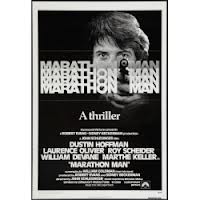
MARATHON MAN
US, 1976, 126 Minutes, Colour.
Dustin Hoffman, Laurence Olivier, Marthe Keller, Roy Scheider, William Devane, Fritz Weaver.
Directed by John Schlesinger.
The credentials of this thriller are excellent: John Schlesinger as director of a William Goldman script from his own novel, Dustin Hoffman and Laurence Olivier, especially sinister with his dentist's drill and wrist knife, lead the cast. The ingredients of the plot, international crime, American universities, American violence, hidden ex-Nazis, are interesting in themselves but the shifts of location from New York to Paris to Uruguay require constant concentration and an alert mind for understanding, which might indicate why the film impresses with some excellent detail. like the initial car rivalry and crash and Hoffman's final confrontation with Olivier, but they do not combine for a completely satisfying whole.
1. An enjoyable and interesting film? The book's reputation as a best seller and William Goldman's adaptation of his own novel? How successfully?
2. The importance of the film's credentials: John Schlesinger and his reputation as a director? Dustin Hoffman, Laurence Olivier and an Oscar nomination? The critics were generally lukewarm or hostile to the film. Why? Screenplay, thews, treatment?
3. How did the film reflect the trend of thrillers in the 70s? Especially the post-Watergate presentation of American politics, espionage, the CIA? The brutality and violence of the thrillers of the 70s? The preoccupation with the old Nazis and their refuge in South America?
4. How much insight into America in the 70s? Especially through the character of Babe? How particularly American was the focus of the film, the international repercussions of American politics and interests? The critique of the CIA and similar activities?
5. How important was the theme of innocent victims in guilty society? Szell and what he represented of the Nazis and guilty society, exploiting prisoners, persecuting Jews? The repercussions for America in the comparison with McCarthyism? and its persecution of victims? The next generation of Jews, of Americans? The web of interrelationships and consequences of guilt?
6. John Schlesinger is noted for his skill in presenting atmosphere with great attention to detail. How was this particularly noticeable in the opening with the television presentation of the Marathon and Babe's running? The various people eg. the man with the dog during the running? The crosscutting to the build-up to the silly race between Jew and German? The people watching, the rivalry and the death with the oil truck? The New York streets, people watching. The later presentation of the baggage strike at the airport? Paris and the garbage strike, the demonstrations, the opera? The visual presentation of Uruguay and the preparation for Szell to depart? How authentic an atmosphere did this give to the various locations? The presentation of details to be used later for eg. Babe's capacity for running, Szell's wrist knife etc.?
7. How well communicated was basic information for the plot? The skill of the crosscutting from Babe, to the accident, to Paris? How well presented were the links between the various characters? The therms? Indications in the dialogue? Many audiences said the material was not presented clearly and was too mysterious. Is this true?
8. Dustin Hoffman's style as Babe? His running, the Games' credits? The illustration of his running eg. the dog, the boys opposite his apartment calling him 'the creep'. A young American man of the 70s generation, education, study, the university, the discussion about his thesis? The importance of the McCarthy? period and the repercussions for his Father? (How important were the flashbacks, the flashes and only partial information, the repetitions throughout the film?) Babe and his study, his work in the library, his life at home in his apartment etc.? How well could audiences identify with Babe and what he stood for, and then share his experience of being victimised?
9. The irony of Babe in his relationship with Else? The irony when it was revealed she was working for Szell? The humour of their meting in the library, his chasing her, pestering her and her seeming rejection? The enjoyment of their outings and the bonds between them? The suddenness of their being mugged in Central Park and the audience knowing who was responsible? The device of the letter written to his brother to indicate what was happening to form a link between Babe and Doc?
10. How convincing and interesting a character was Doc? His dapper appearance in Paris? The sinister visit to the shop, with the chocolates? The suddenness of the explosion? The presence of Janeway in Paris and the link with Doc? The sinister presence of the Chinese? The secrets at the opera house and the build-up to the various boxes and the discovery of the dead man? The sinister colonnades outside and the sudden death of the woman spy and the ball rolling towards Doc? The presentation of Doc exercising, the sinister nature of his apartment and an assassin possibly concealed in a cupboard? His watching the demonstration ? and the audience sharing the anticipation of the man in the wheelchair watching opposite? The Chinese arriving and the deadliness and brutality of their fight, the injury to Doc, the death of the Chinese? The building up of an atmosphere of violence? The irony when Babe was linked to these episodes by his brother?
11. How important was the presentation of Szell's brother at the beginning of the film ? his work with the deposit box, the importance of the key, the seeming humour of his stalling in the car, the Jewish German rivalry with all its implications and hostility? The race, the crash, and the destruction of the key? The consequences of this loss of the key?
12. The introduction to Szell in South America? His way of life, isolation? The scenes of his changing his appearance? The irony of his having to come to New York for the diamonds? The irony also of the Division allowing him? The scenes of his leaving Uruguay in disguise? The peasant assistants?
13. The contrast with Babe's brother arriving? The stealthy sequence and his frightening Babe ? and the audience? The contrast with Doc in America from his behaviour in Paris? The outing, the drink, business deals, the memory of his father ? compared with Babe's memory? The meal and the unmasking of Elsa as a phoney? The build-up to the atmosphere of his death?
14. The build?8? to Doc's death? The confrontation between Szell and Doc in the piazza? The sudden violence of Szell's killing him? His death agony and his dragging himself back to Babe's place?
15. The build-up to the interrogation of Babe? The audience knowing more than he did? The introduction of Janeaway? The police interrogation, the Division?
16. The suspense with the sequence of Babe in the bath, the capture of Babe? The two henchmen of Szell and their brutality? The dentist sequence with Szell repeating 'Is it safe?'? The irony of Babe's escape with Janeaway and the return? The torture and Babe's continual referring to his teeth with his tongue?
17. The drama of the escape, Janeaway's chasing him through the streets? The irony of his being helped by the louts who called him 'the creep'? His contact with them and their help? The contact with Elsa?
18. The irony of Elsa's relationship with Szell's brother? The arrival at the house and Babe's connecting all the threads? Janeaway and his presence? The atmosphere of fear, Babe's use of the gun? The deaths of Janeaway and Elsa?
19. The importance of Szell's wanting to get his diamonds back? The technique of getting the diamonds, going into the vault with the keys, his laugh and disturbing the attendants?
20. Szell and his walking through New York, his behaviour in the shops, his Nazi attitudes emerging, the people recognizing him, the man chasing him and his sudden death, the woman and her shouting?
21. The final confrontation between Babe and Szell? The fight, the diamonds, Babe's making Szell swallow the diamonds. his death and the irony of his stabbing himself?
22. The atmosphere of the ending with Babe reflecting on his experience, the realization of Doc's role, Elsa's? The reality of Szell and his past and his present? Death? The atmosphere of the Marathon Man and his running to free himself?
23. The realism of the film. the ugliness. the violence and the language?
24. The human themes of relationships? The political themes both within America of Babe and his father, Nazism and the parallel with McCarthyism? What insight into human nature and society?
Published in Movie Reviews
Published in
Movie Reviews
Tagged under